BSHS-FCS 005B.indd - University of Phoenix
BSHS-FCS 005B.indd - University of Phoenix
BSHS-FCS 005B.indd - University of Phoenix
Create successful ePaper yourself
Turn your PDF publications into a flip-book with our unique Google optimized e-Paper software.
The Bachelor <strong>of</strong> Science in Human Services (<strong>BSHS</strong>) program<br />
curriculum at <strong>University</strong> <strong>of</strong> <strong>Phoenix</strong> employs an interdisciplinary<br />
approach for assimilating theory, knowledge, skills and core<br />
competencies <strong>of</strong> today’s human service pr<strong>of</strong>essional. The<br />
conceptual framework <strong>of</strong> the program draws from a range <strong>of</strong><br />
human service domains such as counseling, biopsychosocial<br />
development, human systems and social change, social work,<br />
psychology and management theories. The program is designed<br />
with experiential components, integrated within the academic<br />
foundation, to provide students with experience as service<br />
providers in a range <strong>of</strong> human service settings in both private<br />
and public sectors. The <strong>BSHS</strong> program’s interdisciplinary design<br />
builds core skills and competencies based on established<br />
methods for delivering a variety <strong>of</strong> direct service roles in the<br />
wide-ranging field <strong>of</strong> human services. In addition to completing<br />
core curriculum courses, students must declare and complete<br />
courses in an area <strong>of</strong> concentration selected from the following:<br />
1) Management, 2) Addictions, 3) Family and Child Services,<br />
4) Gerontology. Upon graduation from the program students<br />
will be qualified for registry as mental health facilitators with<br />
the National Board for Certified Counselors International and<br />
prepared academically to sit for the Human Services — Board<br />
Certified Practitioner examination administered by the Center<br />
for Credentialing and Education.<br />
College <strong>of</strong> Social Sciences<br />
Bachelor <strong>of</strong> Science in Human Services/<br />
Family and Child Services<br />
Required Course <strong>of</strong> Study<br />
<strong>BSHS</strong> 305 Historical Development <strong>of</strong> Human Services: An<br />
Introduction<br />
In this course, students will learn the historical roots <strong>of</strong> human<br />
services and the creation <strong>of</strong> the human services pr<strong>of</strong>ession.<br />
An investigation <strong>of</strong> current and historical legislation and how<br />
legislation is influenced by public and private attitudes provides a<br />
foundational understanding <strong>of</strong> basic human services ideology. A<br />
deep exploration <strong>of</strong> economic and governance systems affecting<br />
service delivery serves to develop essential skills for understanding<br />
and interpreting historical dynamics related to advocacy and<br />
social change initiatives in human services. Analysis <strong>of</strong> historical<br />
data and exposure to the range <strong>of</strong> political perspectives facilitates<br />
a general introduction and integration to the overall experience <strong>of</strong><br />
the human service worker’s investment in the multidimensional<br />
field. Students will complete Module 1 <strong>of</strong> the mental health facilitator<br />
(MHF) training. (3 credits) Prerequisite: HUM 114<br />
<strong>BSHS</strong> 325 Human Systems and Development<br />
Students will demonstrate a basic understanding <strong>of</strong> human<br />
development across a lifespan and <strong>of</strong> systems for meeting<br />
fundamental human needs. The course provides perspectives on<br />
individual roles in families, groups and interpersonal relationships<br />
in communities, society and organizations. Essential coursework<br />
components <strong>of</strong> human systems and development include theories<br />
<strong>of</strong> group dynamics and diversity, culture, aspects <strong>of</strong> human sexuality,<br />
social systems theory, and general processes affecting both<br />
developmental and social change. Students will complete Module<br />
8 <strong>of</strong> the MHF training. (3 credits) Prerequisite: HUM 114<br />
The U.S. Department <strong>of</strong> Education requires the <strong>University</strong> to provide the following information about each <strong>of</strong> our programs that lead to gainful employment in a<br />
recognized occupation.<br />
83% <strong>of</strong> students who completed this program during the most recent federal award year completed it within 50 months. 1<br />
Related occupations2 Social and Human Service Assistants #21-1093.00<br />
Program costs3 Median graduate debt4 Tuition and fees $33,800 to $76,467<br />
Federal $33,246<br />
Includes cost per credit, application fee, and fees for resources (books/<br />
Private $0<br />
eResources) for students completing the program in normal time.<br />
Institutional $0<br />
1 The on-time completion rate identifies the percentage <strong>of</strong> students completing this program during the most recent federal award year who completed it within “normal time.” The term “normal<br />
time” means the length <strong>of</strong> time it would take a student to complete this program if the student is continuously enrolled, takes a full course load, successfully completes each attempted course, and<br />
does not have any transfer credits. Students enrolled in this degree program are typically nontraditional students. Students may exceed “normal time” for a variety <strong>of</strong> reasons, including, but not<br />
limited to, internships, practicums, clinical rotations, student teaching or administrator experiences required for licensure.<br />
2 Graduates <strong>of</strong> this program will be educationally qualified to enter the occupations listed. Visit onetonline.org for job descriptions.<br />
3 The range provided represents the sum <strong>of</strong> tuition and typical fees required to complete the program within normal time, based on the <strong>University</strong>’s 2012/2013 tuition levels. The actual costs that will<br />
be incurred by a particular student to complete this program will depend upon factors specific to that student. Tuition rates for this program may vary due to factors such as: (i) geographic location<br />
<strong>of</strong> the student; (ii) modality <strong>of</strong> coursework; (iii) military service; and (iv) future changes in tuition rates. The number <strong>of</strong> credits required for a particular student to complete the program will be<br />
dependent upon various factors, including: (i) transfer credits available; (ii) repeated coursework; and (iii) completion <strong>of</strong> additional specializations within this program. Please contact an Enrollment<br />
Advisor for additional information.<br />
4 The figure represents the median amount <strong>of</strong> debt incurred by students who completed the program during the relevant federal award year. The actual amount <strong>of</strong> debt a particular student will incur<br />
to complete this program is dependent on various factors specific to the student. Please contact an Enrollment Advisor for additional information.<br />
Bachelor <strong>of</strong> Science in Human Services/Family and Child Services Program Summary | 1 <strong>BSHS</strong>-<strong>FCS</strong> <strong>005B</strong>
Bachelor <strong>of</strong> Science in Human Services/<br />
Family and Child Services<br />
<strong>BSHS</strong> 335 Ethics and Values for Human Services Pr<strong>of</strong>essionals<br />
In this course, students will become familiar with ethical standards<br />
for human service workers as outlined by the National<br />
Organization for Human Services (NOHS). An emphasis is placed<br />
on understanding concepts <strong>of</strong> least intrusive intervention, least<br />
restrictive environment, facilitating client self-determination,<br />
appropriate pr<strong>of</strong>essional boundary maintenance, and employing<br />
interdisciplinary team approaches to problem solving. Students<br />
will demonstrate understanding <strong>of</strong> requirements for client confidentiality,<br />
electronic record keeping and portability <strong>of</strong> client information.<br />
(3 credits) Prerequisites: <strong>BSHS</strong> 305, <strong>BSHS</strong> 325, MTH 209<br />
<strong>BSHS</strong> 345 Cultural Diversity and Special Populations<br />
The emphasis <strong>of</strong> this course is on the context <strong>of</strong> diverse social<br />
systems including roles <strong>of</strong> ethnicity, gender, sexual orientation, cultural<br />
dynamics, socioeconomic status, variations <strong>of</strong> learning styles,<br />
and individual ability in evaluation and client needs assessment.<br />
To complete this course, a student must demonstrate knowledge<br />
and understanding <strong>of</strong> human limitations and capacity, and <strong>of</strong><br />
the resilient nature <strong>of</strong> humans. The course involves an exploration<br />
<strong>of</strong> special populations to include individuals with disabilities,<br />
economically disadvantaged families and foster children, single<br />
parents including single pregnant women, displaced homemakers,<br />
individuals with barriers to educational achievement (including<br />
those with limited English pr<strong>of</strong>iciency), the aging and elderly, individuals<br />
preparing for nontraditional employment, tribal communities,<br />
refugees and immigrants, and underserved or hard-to-serve<br />
populations in general. (3 credits) Prerequisite: <strong>BSHS</strong> 335<br />
<strong>BSHS</strong> 355 Delivery <strong>of</strong> Human Services<br />
This course facilitates identification <strong>of</strong> specific human needs and<br />
conditions, which are the core <strong>of</strong> the human services pr<strong>of</strong>ession,<br />
and the range <strong>of</strong> human service delivery systems that address<br />
them. The conditions most <strong>of</strong>ten encountered with addictions and<br />
chemical dependency, aging populations, crime, mental and physical<br />
illnesses, poverty, delinquency, and developmental disabilities<br />
will be explored in depth. On completion <strong>of</strong> this course, students<br />
will demonstrate knowledge <strong>of</strong> the theory and skills necessary<br />
for employing the major models <strong>of</strong> human service delivery at<br />
individual, group and community levels with attention to global<br />
influences affecting social policy and the political and ideological<br />
perspectives on human services delivery internationally. (3 credits)<br />
Prerequisite: <strong>BSHS</strong> 335<br />
Bachelor <strong>of</strong> Science in Human Services/Family and Child Services Program Summary | 2<br />
<strong>BSHS</strong> 406 Family and Social Systems: Contemporary Trends<br />
Theories <strong>of</strong> public and private families, as differentiated by societal<br />
interaction, are explored with a focus on family systems as<br />
they exist within social systems. Micro and macro family environments<br />
are investigated. Students will examine theories involving<br />
the interconnected and interdependent features <strong>of</strong> contemporary<br />
families in a range <strong>of</strong> social systems. Topics include the family, the<br />
state and social policy with historical perspectives from federal<br />
and state legislation. Students will debate current trends in social<br />
policy and the efficacy <strong>of</strong> social welfare systems on a global scale,<br />
and demonstrate an understanding <strong>of</strong> the compromise roles <strong>of</strong><br />
the human service worker as advocate and service provider in the<br />
family systems context. (3 credits) Prerequisites: <strong>BSHS</strong> 345, <strong>BSHS</strong><br />
355<br />
<strong>BSHS</strong> 407 Family Violence Across the Lifespan: A Multi-Strata<br />
Problem<br />
This course explores the phenomenon and social problem <strong>of</strong><br />
family violence with both macro- and micro-theory explanations<br />
and an in-depth literature review. Students will demonstrate<br />
an understanding <strong>of</strong> assessment strategies, consequences and<br />
contributing factors <strong>of</strong> family violence across socioeconomic<br />
strata, and the full range <strong>of</strong> diverse populations experiencing<br />
family violence. Attention is focused on pr<strong>of</strong>essional and social<br />
responses that include clinical interventions, educational initiatives<br />
within schools, and responses to the disclosure <strong>of</strong> family<br />
violence in agency and private settings. Skills to develop a human<br />
services approach to preventing family violence are enhanced in<br />
this course; students are required to outline their own personal<br />
and pr<strong>of</strong>essional roles in the movement to end family violence.<br />
(3 credits) Prerequisite: <strong>BSHS</strong> 406<br />
<strong>BSHS</strong> 408 Childhood Abuse and Neglect<br />
This course focuses on the segment <strong>of</strong> family violence involving<br />
physical child abuse, child sexual abuse and exploitation, child<br />
neglect, and psychological maltreatment <strong>of</strong> children. Students<br />
will examine the scope <strong>of</strong> these problems and the characteristics<br />
<strong>of</strong> both victims and perpetrators while conducting a search for<br />
patterns and dynamics <strong>of</strong> each distinction. Students will demonstrate<br />
knowledge and understanding <strong>of</strong> reporting requirements,<br />
treatment interventions, repressed memory controversy, working<br />
within the criminal justice system, and the tenets <strong>of</strong> the Children’s<br />
Justice Act addressing investigation, prosecution and judicial<br />
handling <strong>of</strong> abuse and neglect cases. Areas <strong>of</strong> focus involve various<br />
forms <strong>of</strong> each category including indicators for the range <strong>of</strong><br />
abuses on an international scale with child labor, slavery and child<br />
prostitution issues. (3 credits) Prerequisite: <strong>BSHS</strong> 407
Bachelor <strong>of</strong> Science in Human Services/<br />
Family and Child Services<br />
<strong>BSHS</strong> 375 Information Management Systems and Technology in<br />
Human Services<br />
This course provides the foundation for appropriate integration<br />
and use <strong>of</strong> information management systems crucial to the<br />
delivery <strong>of</strong> human services. Skills developed include methods <strong>of</strong><br />
obtaining, organizing, analyzing, evaluating, maintaining and disseminating<br />
information. Domains addressed in the course involve<br />
the application <strong>of</strong> confidentiality guidelines and the appropriate<br />
use <strong>of</strong> client data, utilizing technology to assist in conducting needs<br />
assessments and basic program evaluation, and accessing research<br />
literature for advocacy and education initiatives. Basic computer<br />
skills such as word processing and the use <strong>of</strong> spreadsheets for<br />
maintaining a database are addressed along with a survey <strong>of</strong> assistive<br />
technology available for a range <strong>of</strong> special needs populations.<br />
(3 credits) Prerequisite: <strong>BSHS</strong> 335<br />
<strong>BSHS</strong> 4150 Orientation to Field Experience<br />
This course will provide an overview <strong>of</strong> the expectations and<br />
requirements for a successful field experience. Students will<br />
be provided with information regarding field placement with<br />
approved sites, documentation <strong>of</strong> field experience, and requirements<br />
for supervision. Orientation is <strong>of</strong>fered well in advance <strong>of</strong> the<br />
first field experience course, <strong>BSHS</strong> 415, to provide students ample<br />
time for field site selection. (0 credits) Prerequisite: <strong>BSHS</strong> 375<br />
<strong>BSHS</strong> 385 Interpersonal Communication and Interviewing Skills<br />
This course enables students to differentiate among the primary<br />
theoretical models <strong>of</strong> personality theory, such as psychodynamic,<br />
affective, cognitive-behavioral and systems theory. Emphasis is<br />
on the importance <strong>of</strong> students recognizing belief systems and the<br />
underlying assumptions inherent in various personality models<br />
that accurately reflect their own personal perspectives. Students<br />
also learn to recognize strategies and approaches in psychology<br />
that reflect identified personality theories as a foundation.<br />
(3 credits) Prerequisite: <strong>BSHS</strong> 335<br />
<strong>BSHS</strong> 395 Client Assessment and Planning<br />
This course enables students to understand the process <strong>of</strong><br />
conducting needs assessments, developing an action plan for<br />
services, implementing the action plan, and subsequent evaluation<br />
<strong>of</strong> outcomes. Students will learn the process <strong>of</strong> developing goals<br />
and measurable objectives, designing an individualized program<br />
for clients, implementing the program, and using ongoing assessment<br />
and evaluation <strong>of</strong> results to revise or modify individualized<br />
programs. Students will demonstrate competency in identifying<br />
needs and mobilizing resources and necessary supports for assisting<br />
clients in meeting goals. Students will complete Modules 10, 11<br />
and 12 <strong>of</strong> the MHF training. (3 credits) Prerequisite: <strong>BSHS</strong> 385<br />
Bachelor <strong>of</strong> Science in Human Services/Family and Child Services Program Summary | 3<br />
<strong>BSHS</strong> 405 Intervention, Direct Service Delivery and Case<br />
Management<br />
This course provides an overview <strong>of</strong> the role <strong>of</strong> the human service<br />
worker as a change agent with a focus on the application <strong>of</strong><br />
theory and skills necessary for providing interventions and direct<br />
service delivery to individuals and groups. Specifically, students<br />
will develop competence in pr<strong>of</strong>essional skills such as case management,<br />
client intake and interviewing, and basic group and<br />
individual counseling techniques. Additionally, students will learn<br />
how to access resources, use consultation and make referrals.<br />
Students will complete Module <strong>of</strong> the MHF training. (3 credits)<br />
Prerequisite: <strong>BSHS</strong> 395<br />
<strong>BSHS</strong> 415 Field Experience I<br />
This is a 15-week course requiring at least 175 hours <strong>of</strong> field experience<br />
or an average <strong>of</strong> 12 hours per week committed to a field<br />
placement site. Students will work in a human services setting<br />
under the supervision <strong>of</strong> a qualified pr<strong>of</strong>essional. In addition to<br />
providing direct service, students will attend a weekly 2-hour class<br />
for faculty supervision and evaluation <strong>of</strong> core competency development.<br />
Typical activities <strong>of</strong> a field placement involve employing<br />
skills acquired so far in the program progression: conducting interviews,<br />
working directly with clients and groups, developing action<br />
plans, and documenting. Students will complete Modules 13 and 14<br />
<strong>of</strong> the MHF training. (3 credits) Prerequisite: <strong>BSHS</strong> 405<br />
<strong>BSHS</strong> 425 Administration and Management <strong>of</strong> Human Service<br />
Programs<br />
Administration and management involve components <strong>of</strong> indirect<br />
services associated with systematic delivery <strong>of</strong> direct human<br />
services. Students will learn theories <strong>of</strong> strategic planning,<br />
human resource management, strategies for evaluation and<br />
planning the development <strong>of</strong> human service organizations,<br />
elements <strong>of</strong> agency operations, risk management, budgeting,<br />
and fiscal acquisition through grant writing and contract<br />
negotiation. The emphasis <strong>of</strong> this course is on leadership<br />
development and managing pr<strong>of</strong>essional and volunteer staff.<br />
Additional content areas addressed in the course involve<br />
advocacy efforts and grassroots movements focused on<br />
constituency building. (3 credits) Prerequisite: <strong>BSHS</strong> 405
Bachelor <strong>of</strong> Science in Human Services/<br />
Family and Child Services`<br />
<strong>BSHS</strong> 435 Research & Statistics in Human Services<br />
This course provides an overview <strong>of</strong> research methods and<br />
appropriate use <strong>of</strong> statistics in the social sciences. A component<br />
<strong>of</strong> program development and evaluation involves knowledge <strong>of</strong><br />
theory related to understanding research and statistics in the<br />
human services arena. The scientific method, research tools, data<br />
collection and analysis will be reviewed. Understanding research<br />
and developing the ability to critically evaluate published research<br />
reports will be emphasized. Statistical concepts will be reviewed,<br />
and students will gain a conceptual understanding <strong>of</strong> underlying<br />
principles <strong>of</strong> research and statistical analysis. Statistical s<strong>of</strong>tware<br />
will be introduced, and students will compute descriptive<br />
and inferential statistical data. Students will practice developing<br />
research designs and conducting statistical analyses. (3 credits)<br />
Prerequisite: <strong>BSHS</strong> 405<br />
<strong>BSHS</strong> 445 A Survey <strong>of</strong> Crisis and Mental Health Issues and<br />
Interventions<br />
In this course, students explore the relationship between mental<br />
health and human service delivery systems in the United States<br />
as well as global initiatives for improving the international service<br />
base. Students will learn to define and describe the nature and<br />
process <strong>of</strong> crisis and the impact <strong>of</strong> trauma-causing events on<br />
the mental health <strong>of</strong> diverse clients. Students will compare and<br />
contrast the range <strong>of</strong> service delivery modalities and networks,<br />
including the operation <strong>of</strong> emergency management systems, and<br />
will demonstrate understanding <strong>of</strong> roles and skills needed when<br />
services are provided in emergency and crisis situations. The<br />
course facilitates development <strong>of</strong> skills necessary for assessing<br />
and managing suicide risk. Students will complete Module 15 <strong>of</strong><br />
MHF training. (3 credits) Prerequisite: <strong>BSHS</strong> 405<br />
<strong>BSHS</strong> 455 Working With Addictions<br />
This course introduces students to the biology <strong>of</strong> addiction,<br />
including brain reward mechanisms, the role <strong>of</strong> environment and<br />
genetics, psychodynamics, and the impact <strong>of</strong> addiction on individuals,<br />
families and communities. The roles <strong>of</strong> addiction in society in<br />
relationship to the judicial system, treatment systems, progressive<br />
era reforms, and complications <strong>of</strong> dual diagnosis are emphasized<br />
in the course. The course examines major models <strong>of</strong> conceptualizing<br />
and integrating prevention, intervention, rehabilitation and<br />
maintenance/relapse prevention. Students will learn strategies for<br />
accessing supportive measure and case management processes<br />
for developing wraparound action plans for service delivery to<br />
individuals and groups with addiction- and chemical dependence-<br />
related issues. (3 credits) Prerequisite: <strong>BSHS</strong> 445<br />
<strong>University</strong> <strong>of</strong> <strong>Phoenix</strong> is accredited by The Higher Learning Commission and is a member <strong>of</strong> the North Central Association (ncahlc.org).<br />
© 2013 <strong>University</strong> <strong>of</strong> <strong>Phoenix</strong>, Inc. All rights reserved.<br />
Bachelor <strong>of</strong> Science in Human Services/Family and Child Services Program Summary | 4<br />
<strong>BSHS</strong> 465 Pr<strong>of</strong>essional Development and Identity<br />
In this course, students will explore processes for enhancement<br />
<strong>of</strong> self-awareness and the effect <strong>of</strong> personal style and personality<br />
on human service delivery. Students will examine personal values,<br />
cultural differences and biases, and individual philosophies and<br />
belief systems, then integrate this understanding <strong>of</strong> self into<br />
the development <strong>of</strong> an identity as a human service pr<strong>of</strong>essional.<br />
Students will demonstrate strategies for cultivating self-awareness<br />
and modeling self-care. Students will investigate the value<br />
<strong>of</strong> membership in supportive pr<strong>of</strong>essional organizations such as<br />
the National Organization for Human Services (NOHS). Students<br />
will complete Module 17 <strong>of</strong> MHF training. (3 credits) Prerequisites:<br />
<strong>BSHS</strong> 425, <strong>BSHS</strong> 455<br />
<strong>BSHS</strong> 475 Field Experience II<br />
This is a 15-week course requiring at least 175 hours <strong>of</strong> field<br />
experience, or an average <strong>of</strong> 12 hours per week committed to a<br />
community human services placement site. Weekly seminars (2<br />
hours per week) are provided to <strong>of</strong>fer support and supervision<br />
<strong>of</strong> activities during the students’ field experience. Students will<br />
learn to present issues for supervision. Each student will create<br />
a portfolio <strong>of</strong> his or her competencies and accomplishments for<br />
career purposes. This course requires accumulation <strong>of</strong> the total<br />
350 service hours necessary for graduation from the program<br />
(the first 175 hours were compiled in <strong>BSHS</strong> 415, FE I) and demonstration<br />
<strong>of</strong> a pr<strong>of</strong>essional attitude and disposition as evaluated<br />
in eight domains: pr<strong>of</strong>essionalism, personal growth, sensitivity,<br />
flexibility, emotional maturity, group membership skills,<br />
accepting feedback and relationship with authority. Students<br />
will complete Modules 7 and 18 <strong>of</strong> the MHF training. (3 credits)<br />
Prerequisite: <strong>BSHS</strong> 465<br />
<strong>BSHS</strong> 485 Capstone: Advocacy and Creating Social Change<br />
This course is the culmination <strong>of</strong> the <strong>BSHS</strong> program with a focus<br />
on the basic tenets <strong>of</strong> client advocacy efforts and the processes <strong>of</strong><br />
creating social change. As human services pr<strong>of</strong>essionals, students<br />
will demonstrate strategies for using their knowledge and skills<br />
for understanding and helping clients. The Capstone Project asks<br />
students to develop an advocacy action plan that addresses a local<br />
need they have determined utilizing a community needs assessment.<br />
Students will complete Module 19 <strong>of</strong> the MHF training.<br />
(3 credits) Prerequisites: <strong>BSHS</strong> 465, all concentration courses


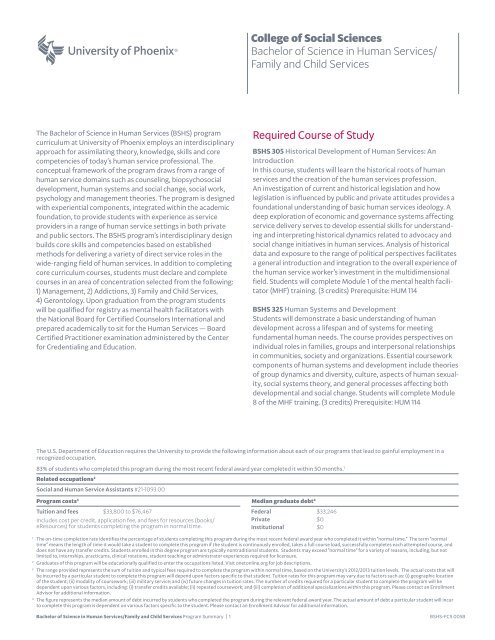
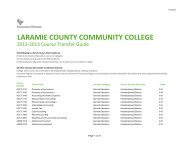
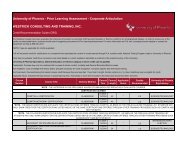
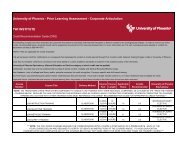
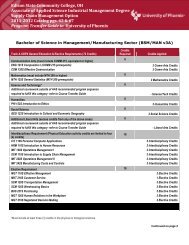
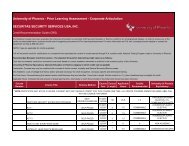
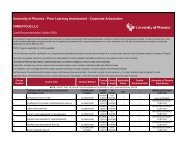
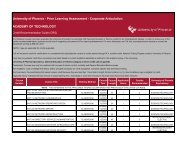
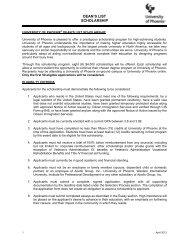
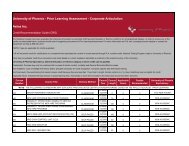
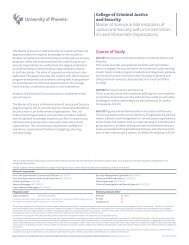
![UNIVERSITY OF PHOENIX [type] SCHOLARSHIP PROGRAM](https://img.yumpu.com/17281122/1/190x245/university-of-phoenix-type-scholarship-program.jpg?quality=85)
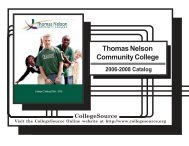
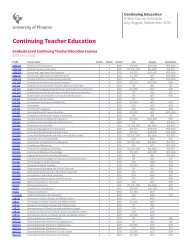
![UNIVERSITY OF PHOENIX [type] SCHOLARSHIP PROGRAM](https://img.yumpu.com/17280724/1/190x245/university-of-phoenix-type-scholarship-program.jpg?quality=85)